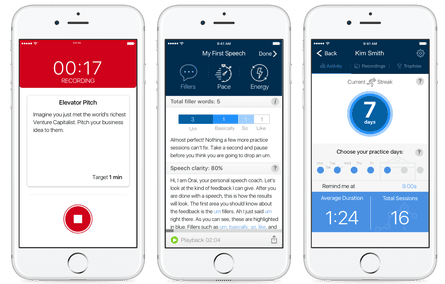Like it or loathe it, being an entrepreneur means a lot of talking. Whether it’s chatting at networking events, pitching to investors, selling your product to customers or explaining it to journalists, talking is a big part of what you sign up for.
“Talking is the way you represent your brand; it’s the way you build credibility in what you’re doing,” says Danish Dhamani, co-founder of Orai, an app that claims to make you a better public speaker. But talking – or rather, public speaking – wasn’t something that came naturally to either Dhamani or business partner Paritosh Gupta.
The pair met in their first year at university in Philadelphia, where they are still based. Dhamani from Pakistan, by way of Tanzania, and Gupta, from India, both found public speaking in English nerve-racking. When Dhamani moved to the US, he was too self-conscious of his accent to pursue job interviews. “Public speaking is already [one of the] top fears in the world, and when English is not your native language it’s even harder,” he says.
To tackle their problem, they joined Toastmasters, a global network of public speaking clubs, and found their skills improved with regular practice. “[No one is] born a public speaker, but anyone can become one,” says Dhamani. “Anyone can go out there and speak like Obama. We wanted to bring that to everyone in the world with Orai – [a kind of] Toastmasters on your smartphone.”

Orai launched on Apple’s App Store in March and has had more than 30,000 downloads so far. Users complete different challenges, such as an elevator pitch (explaining your business idea in 90 seconds) and excellent excuses (speaking for two minutes about why you’re late for work).
The app uses artificial intelligence (AI), developed by Gupta, to track users’ speech and give instantaneous, personalised feedback based on three indicators: use of filler words like “um” and “er”, speed of speech (130-150 words per minute is the optimum), and energy or variation in tone. There are plans to add other features, such as tracking vocal fry (when you drag a word out and your voice starts to shake) and uptalk (an upwards inflection that makes a statement sound like a question), as well as tools for mastering the art of silence, monitoring hand gestures and content analysis.
“When we started, we didn’t know about linguistics and speech science. So we spent six or seven months behind closed doors just reading about this,” Gupta says. The AI algorithm has been modelled on data collected from 3,000 publicly available speeches, such as TED talks, presidential addresses, and speeches by less skilled orators. They also talked to hundreds of speech coaches and academics – one of their advisers is Charles Crawford who worked as the UK foreign office speechwriter in the 1980s and has won successive Cicero awards for speechwriting.
The pair developed Orai while still at university – Dhamani has just graduated with a degree in engineering and Gupta is due to finish in 2018 – so finding the time to run the business has been tough. They took part in the Philly Startup Leaders accelerator earlier this year and have recently been accepted on to the MassChallenge accelerator in Boston. Developing technology that was a viable business proposition has been a challenge, as has branding, the website and legal paperwork. “We had all these ideas, but actually when you see the market reality, you have to adapt very fast,” says Gupta.
There is a premium version of the app due for release this autumn, which they hope will start to generate revenue. It includes extra tests, deeper analytics and the ability to share your recordings with peers to get their feedback. They have also created software for businesses and are already running pilot schemes. “We’re in talks with a bunch of companies who invest a lot in their sales reps, on how Orai can help them close more business, or give managers more insight,” Dhamani says.
The $60,000 (£47,000) investment in the project has come from business competition prize money. Dhamani and Gupta were among the six US winners of the Microsoft Imagine cup, winning $5,000 (£3,890), and will compete against other finalists at the end of July. Dhamani says they are also in talks with angel investors and venture capitalists, and hope to close a seed round by the end of the year.
While the elevator pitch task may be considered ideal for business owners, the app has a broad range of users. The majority are between 20 and 31 years old from around the world – a third of downloads so far have come from south-east Asia. “We’re targeting millennials trying to climb the corporate ladder [in particular],” Gupta says. “Nowadays, every resume looks identical, so [speaking well can] help you stand out in a job interview.”
There’s an obvious counter argument: how can an app that you use on your own help you deal with the fear of speaking in front of other people? “That was where I was initially,” says Gupta. “I had a big fear of being judged by the audience or people interrupting me. As I practised more, I was able to just get rid of that fear. It just became not important to me any more. There is no human judging you [with Orai] – it’s very objective.”
Sign up to become a member of the Guardian Small Business Network here for more advice, insight and best practice direct to your inbox.

Comments (…)
Sign in or create your Guardian account to join the discussion